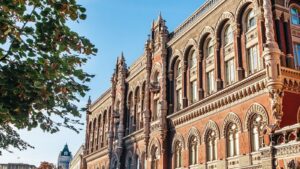
Kharkiv region is provided with CoronaVac vaccine, in addition, the region received a batch of Comirnaty Tris vaccines from Pfizer and a batch of Janssen vaccines is expected, the press service of the regional military administration reports.
“The region has received 14,000 doses of the Comirnaty Tris vaccine from Pfizer. More than 6,000 doses of the Janssen vaccine are also expected. In addition, today the region is supplied with the CoronaVac vaccine in sufficient quantities,” the message says.
According to the director of the HOVA Health Department Maxim Khaustov, in Kharkiv you can get vaccinated in polyclinics, in the region – in other medical institutions. You can get both the first or second dose, as well as a booster or additional. The technical possibility of entering the new Comirnaty Tris vaccine into the Electronic Health System and uploading updated covid certificates to Diya will become available from next week.
Khaustov noted that a new wave of COVID-19 is already beginning in Europe and urged residents of the region to get vaccinated.
“I remind you that the only effective way to counter the disease is vaccination … Depending on which vaccine was made first, you can do a booster dose of both Janssen, which is a vector vaccine, and Comirnaty Tris, which is an mRNA vaccine,” Khaustov said. .
According to him, since the beginning of the vaccination campaign in the region, about 2 million 850 thousand vaccinations have been made, while more than 1 million 100 thousand people have been vaccinated with two doses. Since February 24, 50,000 vaccinations have been made in the region, of which about 40,000 are booster doses.
Since February 24, 20 people have died from complications caused by COVID-19.
Geographical structure of total exports of goods and services in 2021 (USD thousand)

National bank of Ukraine’s official rates as of 08/08/22

Source: National Bank of Ukraine

The depositary of the National Bank of Ukraine resumes operations with government securities following a similar decision made by the specialized regulator of capital markets – the National Commission for Securities and Stock Market (NSSM).
“The resumption of circulation of government securities as the main investment instrument by capital market participants will provide an additional resource for economic recovery. The resumption of operations with these securities will also allow financial institutions to determine their market value,” the National Bank said in a press release on Sunday.
The NBU clarified that, despite the absence of restrictions on transactions with government securities, it has postponed the application of tariffs for depository services until December 22, 2022.
“This step will allow capital market participants to gradually adapt their business processes to new conditions in the financial markets. As before, the depository of the National Bank urges its clients to minimize and, if possible, cancel tariffs for depositary services for their clients during the absence of tariffs of the NBU depository in order to attract additional investments to support the country’s financial front,” the regulator stressed.
He clarified that these changes were approved by the Resolution of the NBU Board dated August 6, 2022 No. 173 “On the non-application of tariffs for depositary services provided by the NBU, as well as for services for accounting and circulation of NBU certificates of deposit and invalidating certain regulatory legal acts of the NBU” which came into effect on 7 August.
As reported, on August 4, the National Securities and Stock Market Commission adopted decision No. 1053, by which it canceled almost all restrictions imposed with the start of a full-scale Russian invasion on work in the capital and commodity markets.
“The step to unblock the capital and commodity markets is timely and balanced, because market participants have confirmed their readiness for the development of the financial sector,” Prime Minister Denis Shmihal was quoted in a statement by the National Securities and Stock Market.
Leading stock exchanges have already announced the restoration of trading in all securities since August 8.
According to the decision of the National Securities and Stock Market Commission, the bans remain in relation to transactions related to individuals and legal entities of the Russian Federation and Belarus. In addition, settlements on the second part of the REPO operation under REPO agreements concluded before the start of the war, as well as applications for redemption from participants in joint investment institutions of open and interval type, are allowed only from August 22, and for earlier transactions, permission from the Commission is required.
At the same time, according to market participants, the activation of the secondary government bonds market may lead to an increase in bond rates, which will create some problems for the Ministry of Finance, which so far refuses to significantly increase them following the decision of the National Bank in early June to raise the discount rate from 10% to 25%. Only at the last few auctions, the Ministry of Finance raised the yield of securities maturing in a year or two to 14-16% per annum.

The flow to enter Ukraine through its western border for the week from July 30 to August 5 amounted to about 304 thousand, while to exit – about 283 thousand, compared to last week, both indicators increased by 8%, reports State Border Service on Facebook.
As a result, net inflows into the country increased to about 21,000 from about 19,000 a week ago, according to its data.
The number of cars passing through the border increased by 9% to about 130,000 in a week, while the number of vehicles with humanitarian cargo cleared by 4% to 447.
Such data is confirmed by the Polish border service. According to her, from July 30 to August 5, 167 thousand entered Poland from Ukraine (a week earlier – 162 thousand), while from Poland to Ukraine – 191 thousand (173 thousand).
In general, since the beginning of the war, 5.297 million have arrived in Poland from Ukraine, while in the opposite direction – 3.409 million.
According to the State Border Service, the flow to enter Ukraine is more than the flow to exit on Saturday-Tuesday, while in the opposite direction – on Wednesday-Thursday.
As reported, since May 10, the flow to enter Ukraine through its western border has steadily exceeded the flow to exit for almost a month. Net inflow during this time amounted to 188 thousand. In the following weeks, there was no such unambiguous trend, and net inflow over the next two months decreased to 81 thousand.
According to UNHCR data, as of August 2, a total of 10.35 million people have left Ukraine since the beginning of the war (excluding entry flow), of which 5.106 million went to Poland, 1.968 million to Russia, 1.089 million to Hungary, 964 to Romania, 9 thousand, Slovakia – 648.5 thousand, Moldova – 557.2 thousand, Belarus – 16.7 thousand.
At the same time, according to the UN, from February 28 to August 2 July, 4.272 million people entered Ukraine (excluding data from Hungary, the Russian Federation and Belarus).